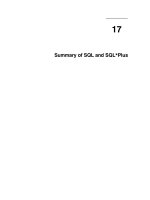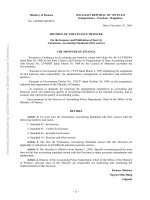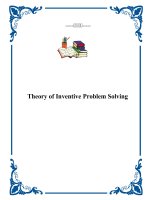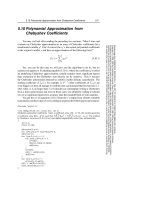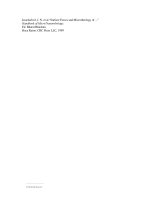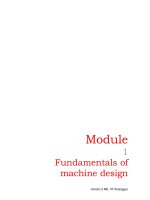Tài liệu Essentials of Economics a brief survey of principles and policies pdf
Bạn đang xem bản rút gọn của tài liệu. Xem và tải ngay bản đầy đủ của tài liệu tại đây (1.36 MB, 128 trang )
Essentials of Economics
a brief survey of principles and policies
by
faustino ballvé
Translated from the Spanish and Edited by
ARTHUR GODDARD
d. van nostrand company, inc.
princeton, new jersey
toronto london
new york
D. VAN NOSTRAND COMPANY, INC.
120 Alexander St., Princeton, New Jersey (Principal office)
24 West 40 Street, New York 18, New York
D. Van Nostrand Company (Canada), Ltd.
358, Kensington High Street, London, W.14, England
D. Van Nostrand Company Ltd.
25 Hollinger Road, Toronto 16, Canada
Copyright,
c
1963 by
WILLIAM VOLKER FUND
Published simultaneously in Canada by
D. Van Nostrand Company (Canada), Ltd.
No reproduction in any form of this book, in whole or in part
(except for brief quotation in critical articles or reviews), may be
made without written authorization from the publishers.
1st edition, Mexico, 1956—10,000 copies
2nd edition, Mexico, 1961—5,000 copies
3rd edition, Mexico, 1961—5,000 copies
French translation, Paris, Sélif, 1957
Spanish editions in Buenos Aires and Guatemala
and in preparation in Colombia
Translations in preparation in Germany, Brazil,
and Japan
printed in the united states of america
Foreword
Faustino Ballvé was one of those rare scholars who instinctively
avoid the pitfalls of specialization; who have the gift of integrating
the divisions of learning simply, yet without oversimplification.
This was the talent that gave the leaders of the Renaissance their
stature. Of Professor Ballvé it could be said, as in the characteri-
zation that gives a contemporary play about Sir Thomas More its
title, that he was indeed “a Man for All Seasons.”
Like Erasmus before him, Professor Ballvé spoke not for any
narrow, nationalistic culture, but for the spirit of Western Civiliza-
tion as a whole. Born in Barcelona, in 1887, he trained first as a
lawyer, took his doctorate in Madrid, and then proceeded for fur-
ther study first to Berlin and then to London. It was in England
that, with a seasoned juristic background, he first specialized in
the study of economics.
The practitioners of that science, whether of the left or the
right, have done all too much to justify the adjective “dismal”
that was applied to it in Ballvé’s youth. The more credit to him
for bringing to the subject not only the clarity and precision of a
first-class legal mind, but also the spiritual warmth of a political
idealist.
While still in his ’teens the young Ballvé had edited a republi-
can paper, and in the stormy thirties, as the clouds of civil war
closed over Spain, he was elected a deputy of that party. But
there was no place for this true liberal when the struggle degen-
erated into a power contest between Fascism and Communism.
Leaving his native land forever, Ballvé went first to France and
v
vi Foreword
then to Mexico, where he acquired citizenship in 1943 and lived
until his death in 1959.
In Mexico City, in addition to the active practice of law, Dr.Bal-
lvé soon took over two professorial chairs—of law and of eco-
nomics. In both fields his interest was always in the underlying val-
ues. He never viewed either law or economics as self-supporting
subjects, or suggested that they could be made so by pseudosci-
entific techniques. He was no positivist, but, in both fields, an
exponent of classical liberalism at its best.
It is the depth of the author’s personal philosophy, plus the un-
usually luminous quality of his thought, that makes his Essentials
of Economics, for all its brevity, an outstanding book. Originally
written in Spanish, as Diez lecciones de economía, then published
in French as L’Économie vivante, it appears now for the first time
in an English edition. The general reader, who may have been
alienated by pretentious texts on economics, will soon see for
himself how quickly, cleanly, and clearly Professor Ballvé reaches
the heart of his subject.
Moreover, something of the warmth and cheerfulness of the
author’s personality comes through, to make the reader feel that
he is listening to the conversation of an old and cherished friend.
In his lifetime, unfortunately, Dr. Ballvé was not as well known in
this country as in Europe and Latin America. That has been our
loss, now compensated by this translation of a study encouraging
to all who fear that western man no longer has the individual
stature to meet the challenge of our times.
Felix Morley
Preface to the
English-Language Edition
In his preface, included here in translation, to the original Mex-
ican edition of this book, Sr. Lic. Gustavo R. Velasco, himself a
distinguished scholar in both law and economics, as well as an
accomplished linguist, points out that elementary introductions
to economic science comparable in clarity, authoritativeness, and
simplicity to Sr. Ballvé’s work are exceedingly rare, not only in
Spanish, but also in other languages. And, indeed, within a year
of its publication, a French translation by M. Raoul Audoin made
its appearance to fill the need of readers of that language in
Continental Europe, where the book soon received the acclaim
it deserved.
Certainly the same need exists in English and has existed for
some time. There are, to be sure, a number of excellent trea-
tises on economics, some of them rather voluminous, which
expound the subject with an exhaustiveness that should satisfy
the most demanding student. But when one looks for simpler
and briefer presentations, designed, not for specialists, but for
the average educated person who seeks enlightenment in regard
to the economic questions underlying the great issues of our day,
there is little to be found that is altogether satisfactory. No doubt
those who have taken the pains to acquire a thorough knowledge
of economics may say that there really is no substitute for the
consummate understanding that only the study of the works of
the masters in this field can provide; anything else is necessar-
ily superficial at best and is likely to be open to sophisticated
vii
viii Preface to the English-Language Edition
criticism. This much may be granted. But the gap between the
erudition of the scholars—a relatively small group, whose pri-
mary influence is in the classroom and the lecture hall—and the
ignorance, not to say prejudices, of even otherwise well-educated
men and women who have not specialized in economic science,
has not been left a vacuum. There is no dearth of pamphlets and
popular books in which inveterate errors and fallacies long since
refuted continue to be given currency. As for the textbooks used
in the secondary schools and the colleges, besides being often
dull and pedantic, they fail, in many instances, to reflect the
present state of economic science, deal with much that is strictly
irrelevant to it, and are, in any case, unsuited to the requirements
of the citizen who wishes to inform himself accurately concerning
the essentials of that subject so that he may have a well-founded,
rationally defensible opinion concerning the consequences to be
expected from the various proposed policies open to his choice
in his capacity as a voter in a democracy.
It was chiefly for this type of reader that the “ten lessons in
economics” here presented were intended. The peculiar merit of
this book is its combination of brevity, readability, and accuracy.
Here the reader will find, within the compass of a few short chap-
ters, a synoptic survey of the essential principles of economics
and an application of them in the critique of popular doctrines
and policies, the whole illustrated with apt historical references
and supported by solid learning. This unusual blend of ped-
agogic skill and sound scholarship gives the work its unique
character and makes it ideally suited to fill a need that has, up
to now, been left, for the most part, unsatisfied. Its translation
into English will have been justified if it helps to clear up some
of the grave misunderstanding and confusion that infect much
of the popular discussion of economic questions and to correct
the faulty opinions that currently constitute the main obstacle to
the diffusion of prosperity and well-being.
The English version is based, for the most part, on the original
Spanish-language edition, but it takes account also of some of
the substantive changes that, as we learn from M. Pierre Lhoste-
Lachaume’s preface to the French translation, were introduced
Preface to the English-Language Edition ix
into the text of the latter at his suggestion. To be sure, not all the
additions, deletions, emendations, and rearrangements made
in the French version have been incorporated into the English
text, for in some cases they appear to have been made—as the
editor frankly admitted—chiefly in the interest of adapting the
book to the concerns of the French public or of bringing certain
points into sharper relief in the light of contemporary European
conditions. However, in view of Sr. Ballvé’s express statement, in
the foreword he wrote for the French translation, of his approval
of the revised text, the latter has been followed here wherever it
seemed to represent an improvement, in vigor and consistency
of expression, over the Spanish original.
At the same time, an effort has been made to assist the reader
by the citation, wherever possible, of the original text and title
of books quoted or referred to by the author in their Spanish
translations. In this connection, indebtedness is gratefully ac-
knowledged to the courtesy of George Allen & Unwin, Ltd., for
permission to quote from William Arthur Lewis’ The Principles of
Economic Planning, 1949.
Arthur Goddard
Preface to the
Spanish-Language Edition
Here is a book that answers an essential need. Simple, clear, and
intelligible, it is a book that had to be written, and, now that it
has been written, it deserves to be and will be read.
Nowadays especially, when many works on economics read like
treatises on hydraulics, and when not a few economists seem to
take an actual pride in the obscurity of their language, it has
really become necessary that someone return to the traditional
conception of it as something more than a technique for spe-
cialists, as a subject concerned with an aspect of experience that
ought to be treated as an integral part of our lives and hence as
one in need of being understood again, if not by everyone, then
at least by the educated and by the intellectual leaders of society.
Of the importance, nay more, of the urgency of this task,
there can be no doubt. It has already become platitudinous
to observe that the great questions of our time are economic
in character or at least are connected with or founded upon
economics. Whereas in the sixteenth and seventeenth centuries
it was religious controversies, and in the nineteenth century
political reforms, that occupied the center of the scene, today it
is the economic problems that appear as vital and decisive; and
even the churches devote a good part of their time and effort to
social and economic preachments, sometimes, one fancies, to
the extent of neglecting their spiritual mission and affairs of a
more exalted nature. To be sure, the question that I regard as
the central issue of our age, viz., the choice that confronts our
xi
xii Preface to the Spanish-Language Edition
generation between a free or voluntary society and a servile or
totalitarian society, does transcend the purely economic plane
and involves broader problems, political and social, and even
questions of mental health and personal morality. Nevertheless,
there can be no doubt that essential to the resolution of the
central issue is an economic element, and that only economic
theory can enable us to come to a reasoned and well-founded
decision either in favor of the market economy or in favor of the
controlled or mandated economy.
For economic theory teaches us, in effect, what will happen
under different sets of circumstances. In clarifying for us what
is presupposed by the diverse ends that we can pursue and what
consequences must follow from our aiming at them, economic
analysis makes it possible for us to choose our goals with full
insight into what it is that we really want and hence to aim at
ends that are mutually consistent and compatible. It is therefore
no exaggeration to qualify it as a technique of rational action and
to assert that without its help it is impossible to make a defensible
choice among the different possible systems of the economic
organization of society.
It may well be, as Röpke observes, that the study of economics
has become essential for our entire civilization because its preser-
vation requires that those in positions of responsibility under-
stand at least the operation of the economic system that forms
part of it. And yet even a cursory glance at the instruction given
in this discipline suffices to show how far we still are from having
answered the need of providing modern man with a clear and
comprehensive conception of the structure and operation of
society and of the place he occupies in it. The economic ideas im-
parted in the courses in civics given in our secondary schools are
as incomplete as they are superficial, and at the undergraduate
level, where there would be greater opportunity for a presen-
tation of this science that would make of it a living part of the
culture of our time, as Ortega y Gasset has advocated, it is not
even studied.
As a result, the average person, including those who by virtue
of their position are called upon to play a leading role in society,
Preface to the Spanish-Language Edition xiii
lacks any economic education or considers economics a futile or
incomprehensible kind of erudition. One of the most pernicious
consequences of this ignorance and of the resulting refusal to
reflect seriously on economic problems is the tendency on the
part of the majority of citizens to favor eclectic compromises
as solutions. They are the more inclined to do so as, in their
blindness to economic reality, they fail to perceive that all of us
have a stake in these problems and that our welfare and even
our freedom and our lives depend on the way in which they are
resolved. This attitude on the part of the public is responsible
for the fact that day by day, slowly but surely, we find ourselves
sliding down the slope of interventionism. Yet it is known that
such a policy does not and cannot constitute a third or “middle”
way between capitalism and collectivism and must lead inevitably
to communism and totalitarianism, unless one of the great crises
that it periodically provokes endows its victims with the necessary
lucidity to decide to abandon it and climb back up the slope.
As can be seen from these very brief considerations, it is not
possible to escape from economics. If it is indeed concerned with
the fundamental problems of society, we shall have to pay heed
to it whether we like it or not. The fact is that all the theories that
are applied to the solution of these problems, including those
that are mistaken because they do not correspond to the present
state of that science or to the actual conditions that they profess
to enable us to control, are economic theories. Neither is it possi-
ble to think of leaving this part of our lives to the economists, not
only because, adapting a phrase of Clemenceau’s, we could say
that economics is too serious a matter to be left to the profession-
als, but also because such an abdication on our part would make
democracy impossible. It is all very well always to listen to the
opinions of the experts and to place in their hands part of the
responsibility for the execution of the policies they recommend;
nevertheless, the fundamental decisions, those involving matters
of basic principle, should be made by all qualified citizens, by all
the intellectual leaders of the community.
The end to be attained by the diffusion of economic education
may be inferred from the foregoing remarks. As Mises says, it is
xiv Preface to the Spanish-Language Edition
not a question of turning every citizen into an economist; it is
simply a matter of preparing him to perform his civic duty so that
he can come to an informed and judicious decision concerning
the discussions and proposals with which we find ourselves daily
confronted at the present time. Knight correctly observes that
what is most depressing about the policy of price control, as
applied, for example, to the freezing of rents, is not the fact that
the tenants possess a greater number of votes than the landlords,
but the state of mind and the benighted reasoning it reveals.
This book of Dr. Faustino Ballvé is small in size, but it con-
stitutes an excellent first step, in the Spanish language, in the
direction indicated in the preceding lines. Indeed, even in other
languages, elementary introductions to economics or works in
which it is explained with the educational purpose I have men-
tioned are exceedingly rare. To write them requires not only
a broad background of knowledge, but perspective; not only
a complete mastery of the material, but the ability to simplify
and a kind of talent that is by no means common. Perhaps the
reason why Professor Ballvé has so well fulfilled the task he set
himself is that, besides having studied economics in the lecture
hall and the library, he has had the opportunity of applying it
and of seeing its results as a civic leader and a holder of public
office, and that to his studies in economics he adds a knowledge
of the law and a career as a member of the bar. In any case, all
of us who think that there is no more vital job at present than
that of defending freedom, which is one and indivisible, and for
that reason quite inconceivable and impossible in the absence of
economic freedom, owe a debt of gratitude to him for this book.
Gustavo R. Velasco
Table of Contents
page
Foreword by Felix Morley v
Preface to the English-Language Edition vii
Preface to the Spanish-Language Edition xi
chapter
1 What Is Economics About?
Economic activity. Economic thought. Xenophon, Aristotle,
Rome, St. Thomas, Oresmius, Biel, Erasmus, Luther, Calvin.
Mercantilism. The physiocrats. Adam Smith and the classi-
cal school. Nationalism. The Historical School. Socialism.
The controlled economy. The Austrian School. The Math-
ematical School. The Critical School. The domain of the
economic: action chosen by man in the market. 1
2 The Market
The autistic and the co-operative economy. The division of
labor, exchange, and the market. Commerce and trade. The
sovereignty of the consumer. Monopoly, economic dictator-
ship, and the black market. 11
3 The Role of the Entrepreneur
Entrepreneur and consumer. Economic calculation. The
data of the market. Factors and means of production. Com-
parative cost. Marginal utility. Diminishing returns. The time
factor. Risk. 19
4 Capital, Labor, and Wages
Utility and disutility. Production as creative. Capital and
profit. Labor and wages. The “wages-fund” theory. The “iron
law of wages.” The labor theory of value. “Social injustice.” 29
xv
xvi Table of Contents
5 Money and Credit
Direct and indirect exchange. Barter and money. The history
of money. Monetary theories. The money market. Credit and
interest. Inflation and deflation. The price of money. Stable
money. The gold standard. 39
6 Monopoly, Crises, and Unemployment
Monopoly and the French Revolution. Monopoly as a po-
litical phenomenon. Business-cycle theories. Boom and de-
pression. Easy money. Unemployment in the modern world.
Theories of unemployment. Keynes. Depression and unem-
ployment. 51
7 International Trade
A quotation from Karl Marx. Caravans and trading posts. The
world market. Marts, trades halls and exchanges, fairs and ex-
positions. Commodity exchanges, warrants, and transactions
at long distance and involving deferred delivery. Futures.
Tribunals of commercial arbitration. Money-changers, bills
of exchange, securities, and the stock exchange. 63
8 Nationalism and Socialism
Nationalism in antiquity. “Political economy.” “National re-
sources.” Autarky. The balance of payments and the problem
of “foreign exchange.” Dumping, import quotas, and the
“black market.” Some verses of Heine. Statistics and the pos-
tulate of abundance. The “unjust distribution of wealth.”
Expropriation. The socialist economy. The theory of ground
rent and the doctrines of Henry George. 70
9 The Controlled Economy
The origin of the modern planned economy. The “weak-
nesses” of the system of free enterprise and their supposed
remedies. The “lack of mobility of resources.” The “unjust
distribution of wealth.” Redistribution and confiscation. Gov-
ernment control of prices and wages. Foreign-exchange con-
trols and restrictions on international trade. Planning in the
backward countries. Planning and communism. 84
Table of Contents xvii
10 What Economics Is Not About
Production, distribution, and consumption. Equilibrium.
Homo economicus. Types of “business associations.” Social
justice. 94
Index 103
1
What Is Economics About?
Economic activity. Economic thought. Xenophon, Aristo-
tle, Rome, St. Thomas, Oresmius, Biel, Erasmus, Luther,
Calvin. Mercantilism. The physiocrats. Adam Smith and
the classical school. Nationalism. The Historical School.
Socialism. The controlled economy. The Austrian School.
The Mathematical School. The Critical School. The domain
of the economic: action chosen by man in the market.
As far back as we go in our study of the way mankind has lived,
from the earliest reaches of recorded history and even from
the times of the prehistoric monuments studied by archeology,
we find men applying their labor to the resources of Nature in
order to satisfy their needs. That is to say, we find them produc-
ing—even if only by bagging game or catching fish or gathering
from fields and forests the wood and the wild fruits they found
growing there, transporting these to the place where they were
to be consumed, and then treating them as marketable com-
modities—and we find them exchanging their produce with
other men, whether directly by barter or indirectly through the
medium of a neutral commodity, viz., money. We find them, too,
competing in offer and demand, according to the conditions of
scarcity or abundance in the supply of specific goods, and exercis-
ing the right of choice—the producer producing what he expects
will yield him the greatest profit, and the consumer buying what
seems to him cheapest and most suitable to his needs. We also
1
2 Essentials of Economics
find them holding on to goods or money, sometimes with the ob-
ject of securing a greater advantage later, sometimes with that of
building up a reserve for hard times. We find those in possession
of goods or money lending, for some consideration, what they
could spare to those in urgent need of it, and we find different
people banding together for production or consumption.
All these human activities, consisting in the exercise of individ-
ual initiative and of the faculty of choice for the satisfaction of
wants and the improvement of what we call today the standard
of living, are, in a more or less primitive and undeveloped form,
as old as mankind. Their modern forms are every day being
extended from the advanced to the backward countries at the
same time that their primitive forms persist into the present day.
Indeed, the latter are still current among civilized peoples, as
we see in the recrudescence of barter during and after the war
even among nations as enlightened as France, Germany, and the
United States.
1
From the earliest times, too, this manifestation of human ac-
tivity has engaged the minds of scholars and thinkers. To go no
further back than the days of ancient Greece,
2
Plato concerned
himself with the division of labor and of the various occupa-
tions; Xenophon dealt with the increase in rents in Attica and
formulated a theory of money; Aristotle spoke of the chrematistic
occupations, expressed the hope that slave labor might be re-
placed by machinery, and anticipated the distinction that Adam
Smith was to make twenty-two centuries later between value in
use and value in exchange. Rome made the protection of agricul-
ture an economic policy—one that was supported in the Middle
Ages by the Catholic Church’s condemnation of trade, its prohi-
bition on the charging of interest, which it characterized as usury,
its repudiation of value in exchange, and its refusal to accept, as
the basis for prices, anything but value in use.
St. Thomas Aquinas advocated a kind of communism that was
later, from 1610 to 1766, to be practiced by the Jesuits of Paraguay.
The French bishop Nicholas Oresmius published a treatise on
money, and Gabriel Biel of Württemberg made investigations
into the nature of money and the formation of prices.
What Is Economics About? 3
Humanism, with Erasmus, esteemed commerce as honorable.
Martin Luther, the founder of Protestantism, postulated that
“man was born to work,” studied the division of labor, and stressed
the importance and utility of trade, recommending the free
market even though he continued to condemn “usury.” On this
last point Calvin disagreed with Luther and was, besides, the first
to advocate the intervention of the state in economic life—an
intervention that already existed in his age and, to a greater or
lesser degree, has always existed and in the last thirty years has
been considered as an economic panacea.
The establishment of absolute monarchies in the sixteenth
and seventeenth centuries and the rise of modern nations im-
bued with an ardent and youthful spirit of nationalism produced
at the same time a control over economic activity and a theo-
retical justification of that control that is known historically as
mercantilism. Its fundamental principles, of which those of the
present age, aptly called neomercantilist, remind us, are: the direc-
tion of economic life by the public authorities, the consideration
of money as true wealth, a concern with a favorable balance of
payments with the object of obtaining more money in interna-
tional exchange, the protection of industry for the purpose of
having articles of export in order to bring money into the coun-
try, a system of subsidies and privileges for exporters and for
industries producing for export or avoiding imports, an increase
in the population in order to augment the productive forces of
the domestic economy, competition with and isolation of for-
eigners by means of tariff barriers, and, above all, the belief that
the prosperity of one country is possible only at the expense of
the others.
These were the principles that inspired the regulation of eco-
nomic life by the omnipotent governments of the sixteenth to
the eighteenth century and were developed, albeit with consid-
erable differences of detail, by Serra, Broggia, and Genovesi in
Italy; by Francis Bacon (Lord Verulam), Thomas Mun, Child,
and Temple in England (while Sir Walter Raleigh attributed the
economic superiority of Holland to its greater economic free-
dom); by Melon and Forbonnais in France; by Klock, Secken-
4 Essentials of Economics
dorff, Becher, and Baron von Schoeder in Germany; and by
Luis Ortiz, Moncada, Damián de Olivares, Gracián Serran, Jerón-
imo Ustariz, and Bernardo de Ulloa in Spain. The statesman
who has come to be regarded as the most representative his-
torical exemplar of this tendency is Colbert, the minister of
Louis XIV.
The mercantilist system led to disastrous consequences; for the
fragmentation of economic and political groups ended by stran-
gulating general economic life and producing internal misery
and external war. The example of Holland led Queen Elizabeth
of England to grant greater freedom to commerce and to reduce
the importance of the guilds. Incipient liberalism, supported by
the doctrine of natural law, immediately inspired a critique of the
whole mercantilist system and a scientific trend in the opposite
direction that is known as the physiocratic school. Its initiators
were Pierre de Boisguillebert, Marshal Vauban, and, above all,
Quesnay, personal physician to Louis XV. They were followed by
Vincent Gournay, the elder Mirabeau, and, to some extent, the
celebrated statesman Turgot.
As its name indicates, this doctrine was founded on the prin-
ciple that there are natural laws of economic life that operate
automatically. The evils of mercantilism come from interference
with these laws on the part of the state. Hence, it is advisable to
abstain from all regulation of economic activity and to leave it
entirely to individual initiative. This principle Gournay reduced
to the celebrated phrase: laissez faire, laissez passer.
The physiocratic doctrine, in so far as it was a reaction against
mercantilism, found propitious soil in England. There neither
the mercantilist worship of money nor the veneration of agricul-
ture as the sole foundation of national wealth, which the phys-
iocrats had taken over from the canonists, had ever completely
prevailed. However, the English did not content themselves with
the mere affirmation of the existence of natural laws with whose
operation the state ought not to interfere, but wanted to investi-
gate these laws and determine what they are; and thus they gave
the world the so-called classical school of economics. The way was
What Is Economics About? 5
opened by Hutcheson and David Hume, who in turn influenced
Adam Smith, the author of the first treatise on economics prop-
erly so called, entitled Inquiry into the Nature and Causes of the
Wealth of Nations (1776). In England David Ricardo and, to a
certain extent, both James Mill and his son John, in France
Jean-Baptiste Say and Frédéric Bastiat, and in Germany Henry
and J. H. von Thünen, Rau, Hermann, and Nebenius took their
inspiration from Smith.
A discordant note was struck in England by Robert Malthus,
an Anglican curate, with his theory that population tends to in-
crease faster than the means of subsistence. He advised recourse
to measures designed to avoid the disastrous consequences of
simply allowing the laws of nature to run their course. In the
United States the classical doctrine was embraced by Franklin
and Hamilton (who was, notwithstanding, a protectionist). The
chief exponents in Spain were José Alonso Ortiz, who translated
Smith’s work and wrote a commentary on it, and Alvaro Flores
Estrada, who nevertheless also initiated the movement of agrar-
ian reform that almost a century later was to bring renown to the
American Henry George.
The apogee of the classical school coincided with the fabulous
increase in production and international exchange consequent
upon the introduction of machinery (the Industrial Revolution)
3
and the improvement of communications. But three circum-
stances brought the classical doctrine into disrepute. The first
was the discovery that what had been taken for laws presumably
deducible from the observation of economic phenomena in a
limited geographical area (England and France in particular),
and about which there was considerable disagreement among
the adherents of the classical school, were not really laws at
all, but mere regularities that, when treated as infallible laws,
often failed in their application. The second was the inferior
competitive position in which the younger countries, especially
Germany and the United States, felt themselves to be on the
world market. The third was the general opinion, more or less
well founded, but disseminated by propaganda and unreflect-
6 Essentials of Economics
ingly accepted by the intellectuals and the middle class, that the
lower classes and especially the workers were not benefiting from
the material progress engendered by free enterprise.
Hence arose three counter movements: nationalist protection-
ism, launched in Germany by Frederick List, of which the last and
most eminent representative was Adolf Wagner (a policy advo-
cated in the United States by Henry Carey and in England by the
elder Chamberlain and the adherents of the tariff-reform move-
ment); socialism in its diverse forms, of which the most prominent
was the so-called “scientific socialism” of Karl Marx and Frederick
Engels; and the so-called Historical School (Bruno Hildebrand,
Knies, Roscher, Schmoller), itself a reflection of both romanti-
cism and the positivism of Auguste Comte, according to which
every country has its particular economy corresponding to its
conditions and traditions and serving the national interest rather
than that of the individual. These three trends of thought, includ-
ing the socialist, which originally had a cosmopolitan character,
tended toward acceptance of the myth of national wealth, to
which they subordinated that of the individual, and in whose
defense they affirmed that all measures are legitimate in the
name of “sacred egoism.”
It is curious to note that these doctrines, which called them-
selves “modern,” and which we shall study in detail later, in
spite of their professed opposition to classical liberalism, all (in-
cluding Marxian socialism) followed in its footsteps and are not
so much its adversaries as its offspring. In the first place, they
conceive of the theme of economics, not as man’s universal
struggle for well-being, but as national, political economy. Thus,
quite recently, Professor Fuchs, of Germany, has defined political
economy
4
as “the study of the economy of a people” and con-
sidered its function to be that of the “ever increasing support
and ever more perfect satisfaction of the necessities of a grow-
ing population in a given territory.” In the second place, these
doctrines do not grasp the economy in its unity and totality, but
continue to treat distribution and consumption separately and
without any connection, as if they were independent entities and
not merely parts of a general process. In the third place, they
What Is Economics About? 7
persist in the belief in the existence of laws that control the eco-
nomic process independently of the will of man. Thus, Marx
himself—contrary to all previous as well as all subsequent expe-
rience—conceived of the historical course of economic devel-
opment as presided over by the great law of the concentration
of capital, by virtue of which wealth is every day becoming con-
centrated in fewer hands while the “army of the proletariat”
increases, until the inevitable moment comes when “the expro-
priators will be expropriated.”
It did not occur to the exponents of these doctrines that eco-
nomic events are not inevitable, but the product of man’s free
will; that production, distribution, and consumption are sim-
ply different aspects of a single economic process; that, in spite
of nationalistic and isolationist experiments, the economy of
the whole world constitutes a unified totality; or; finally, that
no law or government has succeeded or indeed can succeed in
preventing every man from striving after his own and his loved
ones’ earthly well-being in the way he considers most suitable by
making use of his faculty of free choice (the natural corollary
of his liberty, as we see in the activities of smugglers in con-
travention of the laws limiting international trade and in the
so-called “black market” in violation of the legal restrictions on
domestic commerce).
These three “modern” tendencies—distrust of individual ini-
tiative, exacerbated nationalism (called chauvinism after the ultra-
nationalist French Bonapartist Chauvin), and socialism—were,
for all practical purposes, combined, at the end of the nine-
teenth century and the beginning of the twentieth, in neomer-
cantilism. This began in the Germany of Bismarck and in the
United States, spread by reaction to England, France, and
other countries, produced the two world wars, and destroyed
the international division of labor. Christened in Germany in
1920 the “planned economy” (Planwirtschaft) and later every-
where called the “controlled economy,” under the pretext of
defending national interests against foreign competition and the
humbler classes against domestic oppression, it has enthroned
the omnipotent state wherever it has gained a foothold and has
8 Essentials of Economics
forced democracy and liberty, whose universal victory was once
thought to have been finally assured, into retreat.
But the love of liberty is no less imperishable than the love
of knowledge, that is, the unprejudiced and fearless quest for
truth. It was this strictly scientific spirit that inspired Carl Menger,
around 1870, to undertake a revision of the prevailing economic
doctrines with the object of placing economics on a truly scien-
tific foundation.
Menger, a Viennese professor of economics, formulated the
theory of marginal utility (Grenznutztheorie)
5
almost at the same
time as Stanley Jevons did in England and Léon Walras in France.
From it issued two distinct currents of thought: the Mathemat-
ical School and the so-called “Austrian” School represented
by Menger himself, Böhm-Bawerk, Wieser, and others, and at
present by Ludwig von Mises, author of Human Action,
6
and his
pupil, Friedrich von Hayek, author of the famous book entitled
The Road to Serfdom.
7
Both are today professors in the United
States with an increasingly large number of disciples, and sup-
porting their position is the American economist Henry Hazlitt,
author of the famous Economics in One Lesson.
8
The Mathematical School, which reached its height in the
work of the French economist Cournot, has given rise to two
divergent streams of thought: one branch, starting with Walras,
Pareto, and Pantaleoni, has developed so-called “econometrics,”
which professes to be able to attain complete exactitude in eco-
nomic calculation and is the chief bulwark of the ideology of
central economic planning at the present time;
9
while the other,
starting with the English economist Marshall, uses mathemat-
ics solely as a graphic means of expressing economic doctrines
without pretending in any way to have made of economics an
“exact science.” Among these mathematical economists should
be mentioned John Bates Clark and Irving Fisher.
Walter Eucken and Wilhelm Röpke, both German (although
the latter has done most of his work in Egypt and Switzerland),
represent a liberal, nonmathematical tendency. In France, which
has maintained a high rank in economic science, the liberal
movement is represented by such eminent figures as Charles
